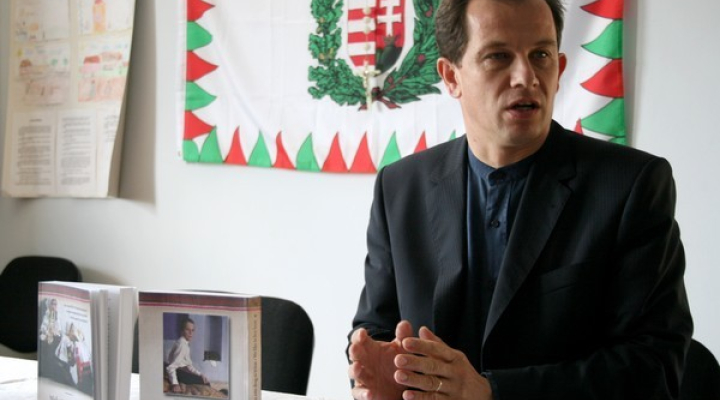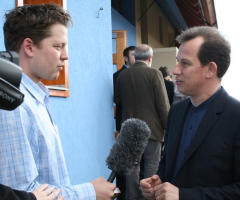A new Csángó Action Plan is being prepared
Sógor: we ought to continue doing everything in our power to preserve the identity of the Csángó Hungarian minority as long as there is even one person who declares himself Csángó Hungarian.
The Association of Csángó Hungarians in Moldavia is twenty years old, the Csángó Education Program started ten years ago and the first Csángó Action Plan was also presented ten years ago. These anniversaries constituted the basis for the Association’s decision to evaluate the results of the recent years and prepare new plans for the preservation of the Hungarian culture in Moldavia. In order to prepare a new Csángó Action Plan, a conference lasting several days was organized between April 7 and 10 in Csángó Land.
The newly developed Csángó Action Plan determines the planned activities of the next ten years, that is subject to available funding. In term of education, the already existing Education Program will be enlarged through private kindergartens, bilingual day-care centers and the establishment of a Hungarian dormitory in Bacãu. With regards to economic aspects, the Association aims to attract Hungarian investors and create more jobs in the region, while in terms of culture, a better integration into the Hungarian community is planned through the establishment of new Hungarian Houses, cultural centers and the foundation of a Csángó youth organization. The Association intends to broaden the possibility of free religious practice and the dialogue with the clergy so that Hungarian elements will be introduced into the Romanian Masses on the occasion of the Hungarian holidays.
DAHR’s MEP Csaba Sógor presented the book about the Csángós entitled “We like to live here”, published with his support, on the second day of the conference at the Hungarian House in Pustiana. The book was published on the tenth anniversary of the 1521/2001 Recommendation of the Council of Europe and presents the current situation of the Csángós.
“Minority issues do not constitute EU competence, they are in the care of the member states. This is why we can see differences all over Europe. The book aims to raise awareness about the Recommendation of the Council of Europe that the state cannot overlook” – said the MEP, who also declared that we ought to continue doing everything in our power to preserve the identity of the Csángó Hungarian minority, as long as there is even one person who declares himself Csángó Hungarian.
In relation to the Csángó Action Plan, the Hungarian MEP from Transylvania said that that the Association needs to pay more attention to the different sources of EU funds and make use of every possibility. He stressed that the Association needs to ensure the solidarity of the Csángó Hungarians because the next ten years can only be successful if the community is united.
Csaba Sógor believes that the identity of the Csángó Hungarians can be better preserved if more relationships are established with the Hungarian community in Szeklerland and this could be achieved through the establishment of sister town relations. This idea was welcomed by Csaba Borboly, president of the Harghita County Council, who added that the Csángó workgroup within the Harghita County Council is working on developing more programs to bring the Csángó Hungarian and Szekler youth closer together. The president believes that Hungarian relations can be used in economic matters as well, therefore they intend to promote traditional Csángó products, just like they have done with the traditional Szekler products.
Ádám Szesztay, representative of the Hungarian Ministry of Foreign Affairs was also present at the conference and said that they will ensure that the provisions of the Csángó Action Plan will be included into the section about Hungarian living in the Diaspora of the soon to be completed Hungarian National Strategy.
The newly developed Csángó Action Plan determines the planned activities of the next ten years, that is subject to available funding. In term of education, the already existing Education Program will be enlarged through private kindergartens, bilingual day-care centers and the establishment of a Hungarian dormitory in Bacãu. With regards to economic aspects, the Association aims to attract Hungarian investors and create more jobs in the region, while in terms of culture, a better integration into the Hungarian community is planned through the establishment of new Hungarian Houses, cultural centers and the foundation of a Csángó youth organization. The Association intends to broaden the possibility of free religious practice and the dialogue with the clergy so that Hungarian elements will be introduced into the Romanian Masses on the occasion of the Hungarian holidays.
DAHR’s MEP Csaba Sógor presented the book about the Csángós entitled “We like to live here”, published with his support, on the second day of the conference at the Hungarian House in Pustiana. The book was published on the tenth anniversary of the 1521/2001 Recommendation of the Council of Europe and presents the current situation of the Csángós.
“Minority issues do not constitute EU competence, they are in the care of the member states. This is why we can see differences all over Europe. The book aims to raise awareness about the Recommendation of the Council of Europe that the state cannot overlook” – said the MEP, who also declared that we ought to continue doing everything in our power to preserve the identity of the Csángó Hungarian minority, as long as there is even one person who declares himself Csángó Hungarian.
In relation to the Csángó Action Plan, the Hungarian MEP from Transylvania said that that the Association needs to pay more attention to the different sources of EU funds and make use of every possibility. He stressed that the Association needs to ensure the solidarity of the Csángó Hungarians because the next ten years can only be successful if the community is united.
Csaba Sógor believes that the identity of the Csángó Hungarians can be better preserved if more relationships are established with the Hungarian community in Szeklerland and this could be achieved through the establishment of sister town relations. This idea was welcomed by Csaba Borboly, president of the Harghita County Council, who added that the Csángó workgroup within the Harghita County Council is working on developing more programs to bring the Csángó Hungarian and Szekler youth closer together. The president believes that Hungarian relations can be used in economic matters as well, therefore they intend to promote traditional Csángó products, just like they have done with the traditional Szekler products.
Ádám Szesztay, representative of the Hungarian Ministry of Foreign Affairs was also present at the conference and said that they will ensure that the provisions of the Csángó Action Plan will be included into the section about Hungarian living in the Diaspora of the soon to be completed Hungarian National Strategy.












